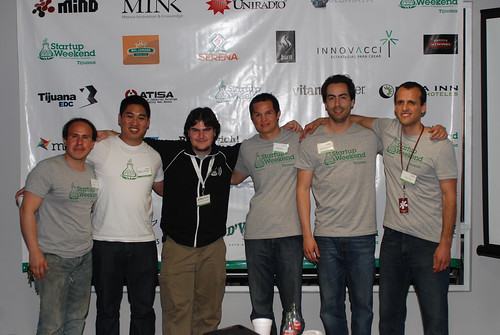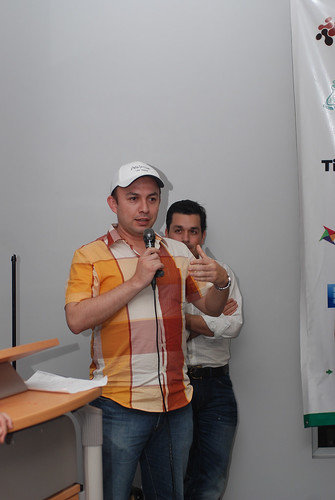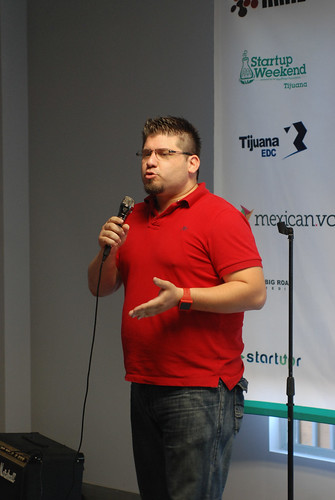On the second
day of SWTJ, I had the chance to talk to all of the teams about their
products. Keep in mind that the products
described below do not necessarily reflect the final product that was presented
on Sunday.
Bacheo/Wachabump
 Bacheo/Wachabump
is a smartphone and web app that allows users to report potholes to the government. Pictures of the potholes along with GPS or
other locating information can be uploaded by users and this data would be
accessible to all. There were ideas of making a pothole density map from the
data, which could be used to show where the worst roads were. The end goal of the app is to pressure the
government into fixing the roads.
Bacheo/Wachabump
is a smartphone and web app that allows users to report potholes to the government. Pictures of the potholes along with GPS or
other locating information can be uploaded by users and this data would be
accessible to all. There were ideas of making a pothole density map from the
data, which could be used to show where the worst roads were. The end goal of the app is to pressure the
government into fixing the roads.
This product
reminded me strongly of DIYDemocracy, a company that operates out of AnsirInnovation Center. I like all ideas that
improve government accountability and am excited about Wachabump, my only
concern is that the idea in its current form is not too accessible to the
average Mexican. The number of Mexicans
who can afford smartphones is low and the number of who have data plans is even
lower. Basic internet access cannot be
said to be a given. I imagine that the
communities who would benefit the most from this app would also be the most
impoverished, so I suggested that they think about a SMS reporting system as
well.
Indueducation
 This team
pivoted a bunch of times, but the pitch that I got made me think of an eHow.com
for university teachers. The problem today
is that university professors do not know what to teach in regards to industry
software, so before planning a course, the professor would log on to the
Indueducation website and see what kind of software was being used in a
particular industry. In addition to industry
information, Indueducation would also provide tutorials and guides for the
software.
This team
pivoted a bunch of times, but the pitch that I got made me think of an eHow.com
for university teachers. The problem today
is that university professors do not know what to teach in regards to industry
software, so before planning a course, the professor would log on to the
Indueducation website and see what kind of software was being used in a
particular industry. In addition to industry
information, Indueducation would also provide tutorials and guides for the
software.
I was not
much of a fan when I heard this idea as two very big problems came to
mind. First, I questioned whether or not
professors had that much control over their own courses. Second, how were they
going to get these detailed and dense guides?
One problem, the team has no control over and the other seems like it
would cost a lot of money to solve.
HbD2.me
 HbD2.me is a
site where venues can register and approach users on their birthdays with
promotions. There would also be a
recommendation engine for users looking to plan a party that would steer them
towards appropriate promotions. Users
can also upload existing promotions as well, such as if they knew of a
restaurant that offered a free meal on your birthday.
HbD2.me is a
site where venues can register and approach users on their birthdays with
promotions. There would also be a
recommendation engine for users looking to plan a party that would steer them
towards appropriate promotions. Users
can also upload existing promotions as well, such as if they knew of a
restaurant that offered a free meal on your birthday.
There was
some concern that for birthday parties the team was targeting the wrong person,
since usually the person having the birthday does not plan their own
party. The team explained that it was
not just for restaurants but other businesses as well such as.
The targeting
might need some a little tweaking, but overall I thought this was an awesome
idea and HbD2 gets extra points for doing something that I have not seen yet. Their model could definitely be applied to other
celebrations as well.
I suggested
they Photoshop a screenshot of the site as a minimum viable product and
publicize it on Facebook in order to get validation on the idea as well as
feedback on what features to include or take out.
Cruzas
 Cruzas is a
real time traffic app for the US border crossing. Currently, the info services on border
traffic such as calling the border guards are inaccurate to the point of being
useless. Cruzas aims to solve this problem by crowd sourcing and aggregating
all current info sources. There was also
talk of a Waze like app that actively tracked the position and speed of the
user’s car and shared it with other users as well as allowed drivers to ping
each other. In the final product, users
would be able to see a heat map of the fastest lanes.
Cruzas is a
real time traffic app for the US border crossing. Currently, the info services on border
traffic such as calling the border guards are inaccurate to the point of being
useless. Cruzas aims to solve this problem by crowd sourcing and aggregating
all current info sources. There was also
talk of a Waze like app that actively tracked the position and speed of the
user’s car and shared it with other users as well as allowed drivers to ping
each other. In the final product, users
would be able to see a heat map of the fastest lanes.
Cruzas seemed
like a product with an extremely small market, namely people who cross the
US-Mexican border regularly. For frequent
border crossers, there is already the Sentri pass that gives them dedicated
lanes sort of like Fast Trak. Where
could Cruzas fit in all of this? That
was my thought until I heard the overwhelmingly positive reactions from the
frequent border crossers at the event. Apparently
there are two border crossings in California, and choosing the right one could
save you two to three hours one way, even with the Sentri pass. With over a million people who cross the
border every year, Cruzas could very well become a decent passive income
product if they used a subscription based revenue model.
Eventum
 Eventum is a
user generated public events calendar. Any
user can create a public event and it will integrate with social media sites. Users
will be able to buy tickets to the events straight from the Eventum site. The
site’s focus will be on local businesses and each event page will have their
own QR code.
Eventum is a
user generated public events calendar. Any
user can create a public event and it will integrate with social media sites. Users
will be able to buy tickets to the events straight from the Eventum site. The
site’s focus will be on local businesses and each event page will have their
own QR code.
The event
discovery space is rife with competition, but nobody seems to be able to do it
right. I showed the team the Roamz app,
which is the best (but still terrible) event discovery app I have used to date. Eventum is a bit too similar to Eventbrite
for my liking, despite the team leader’s insistence that it is different
because it focuses on local businesses and event discovery.
Congresoplon
 In Mexico
there a lot of problems with government transparency and Congresoplon which
roughly translates to "Congress Snitch" aims to change that. Currently, public information such as
attendance and voting records are available to the public but not very
accessible. Congresoplon is a website
that would put all of that public info about representatives in an easy to
understand format. Congresoplon would
give representatives a grade on how well their voting record reflects the will
of their constituents. They will be
targeting the federal government first.
The ultimate goal is to get representatives to be more accountable and
connected to their constituents.
In Mexico
there a lot of problems with government transparency and Congresoplon which
roughly translates to "Congress Snitch" aims to change that. Currently, public information such as
attendance and voting records are available to the public but not very
accessible. Congresoplon is a website
that would put all of that public info about representatives in an easy to
understand format. Congresoplon would
give representatives a grade on how well their voting record reflects the will
of their constituents. They will be
targeting the federal government first.
The ultimate goal is to get representatives to be more accountable and
connected to their constituents.
I am always
enthusiastic about things that make government more accountable, so immediately
I was drawn to Congresoplon. There are a
couple of sites like Congresoplon in the US and and if Mexico doesn't have any
equivalents already, it really should.
One of the mentors suggested they look for a grant from the Carter
Institute, which promotes government transparency and that seemed like a
brilliant idea to get funded and still remain neutral. Out of all the teams at SWTJ, Congresoplon was
the only team that I could see having an effect on the average Mexican
citizen.
Instapart
The tagline
for Instapart was "find used parts for your car in under 90 seconds"
and the team billed it as a twitter for junkyards. Users visit the Instapart site and quickly
type in what car part they need and for what car model, then Instapart blasts
that query out to junkyards in the area and returns results in 90 seconds. Results are sorted by distance, rating of the
junkyard, and price.
I was really
impressed with the team when they told me that they called and even visited
some junkyards in order to validate their product. Alline, a mentor from San Diego, suggested
they use try selling a part on Twitter as their minimum viable product and me being the one who is
always trying to make the product as inclusive as possible, suggested they
allow for SMS queries too.
Pimiento/Pepper
 Pimiento is a
smartphone that lets you look up recipes by entering in what you have in your
fridge. I was really surprised that
Pimiento received the most votes from the audience since the idea of searchingfor recipes by ingredients has been around for at least five years. However, when I saw the mockups I became more
enthusiastic about it.
Pimiento is a
smartphone that lets you look up recipes by entering in what you have in your
fridge. I was really surprised that
Pimiento received the most votes from the audience since the idea of searchingfor recipes by ingredients has been around for at least five years. However, when I saw the mockups I became more
enthusiastic about it.
The biggest
problem with Pimiento is that it is targeting the smartphone demographic, which
is also the demographic that doesn't cook!
Even when I asked the team if they cooked, all of them said not
really. This team had some trouble
thinking up a revenue model, and I suggested they follow the freemium model,
where users will have access to a basic free app and then be prompted to buy
premium features such as additional recipes.













